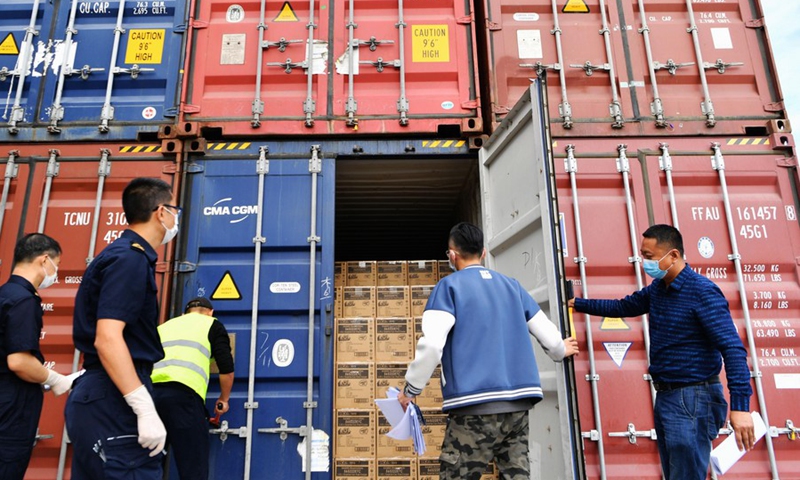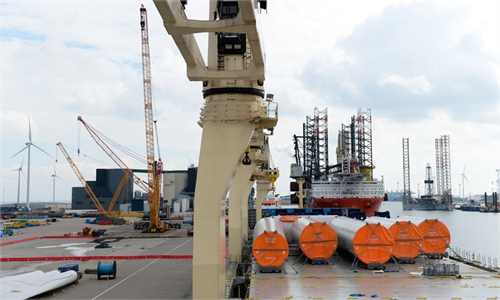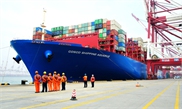Chinese stake in Hamburg port injects stability into bilateral relations, strengthens supply chain

Staff members check the cargo bound for Hamburg of Germany at a cargo distribution centre in Haicang District of Xiamen, southeast China's Fujian Province, Nov. 13. (Xinhua/Wei Peiquan)
The deal between Chinese shipping giant COSCO Shipping Group and Hamburg port in Germany on a stake investment in a terminal in the port doesn't create one-sided dependency, as some German politicians have said, but injects stability into important China-Germany relations, experts and businessmen said.
The German cabinet approved on Wednesday an investment by COSCO Shipping Ports for a 24.9 percent stake in one of logistics firm HHLA's three terminals in Germany's largest port in Hamburg, Reuters reported.
HHLA said that it welcomed the deal in a newsletter of the Port of Hamburg on Wednesday.
"We appreciate that a solution has been found in objective and constructive talks with the federal government," said Angela Titzrath, chairwoman of HHLA's executive board.
The cooperation doesn't lead to any one-sided dependency - on the contrary, it strengthens supply chains, secures jobs and promotes value creation in Germany, said HHLA in the letter, rebutting concerns expressed by some German politicians who claimed that the deal "disproportionately expands China's strategic influence on German and European transport infrastructure as well as Germany's dependence on China," according to a Reuters report.
HHLA said that smoothly functioning logistics are a basic requirement for global trade flows and prosperity. Progress and security only exist on the basis of cooperation, common goals and interests, according to the newsletter.
When in the future the port gets concrete benefits from the cooperation with COSCO Shipping Group, the facts will speak for themselves and those who argued against it will see the fault in their logic, Zheng Chunrong, director of the German Studies Centre at Tongji University, told the Global Times.
The approved investment is a blocking minority, and it's less than the initially planned 35 percent stake. The deal is the result of a compromise among multiple parties and the outcome leaves room for maneuver for China-Germany cooperation in the future, Zheng noted.
COSCO Shipping Ports can acquire a minority share of less than 25 percent in the operating company of Container Terminal Tollerort (CTT) GmbH in Hamburg
According to HHLA, the deal will strengthen HHLA's viability and secure jobs. COSCO Shipping Ports can acquire a minority share of less than 25 percent in the operating company of Container Terminal Tollerort (CTT) in Hamburg.
"With CSPL's investment, CTT will become a preferred hub for Asian traffic," it said.
China's investment in the port will serve as a ballast for China-Germany ties and China-Europe container trade while ensure the stability of global supply chains against the US-led decoupling trend, Wu Minghua, a veteran Chinese shipping analyst, told the Global Times on Thursday.
Wu noted that the Port of Hamburg plays an important role in routes between Asia and Europe, and it is an important hub for transportation to Northern Europe through Germany with developed rail management systems.
In 2021, a 5.5 percent advance to 2.6 million TEU was achieved and China consolidated its position as Hamburg's leading trade partner by a wide margin, according to data released by the port of Hamburg.
On the one hand, Chinese shipping companies many have the chance to optimize the schedule of the ships and bring goods from other European ports for transit; on the other hand, the booming business will maximize profit, leading to more jobs and economic benefits, Wu added.
China-Germany cooperation, coming as the world is recovering from the supply chain shock caused by the pandemic and divisions triggered by US-led decoupling, offers a good starting point for China-Europe trade and investment, and it sets a good example for ensuring the stability of the maritime supply chain, Wu said.
China and the EU are important economic and trade partners, and they share broad common interests and have huge space for cooperation, Shu Jueting, spokesperson of the Ministry of Commerce (MOFCOM), told a press conference on Thursday.
Since the beginning of this year, China-EU trade has maintained steady growth despite the impact of the pandemic and other adverse factors.
In the first three quarters of this year, bilateral trade reached more than 4.2 trillion yuan ($580 billion). China remains the EU's largest trading partner, while the EU remains China's second-largest trading partner, said Shu.
"China is ready to share development opportunities with the EU, actively promote trade and investment liberalization and facilitation, jointly maintain the stability and smooth flow of industrial and supply chains, and promote the sound development of China-EU economic and trade cooperation," Shu said.


